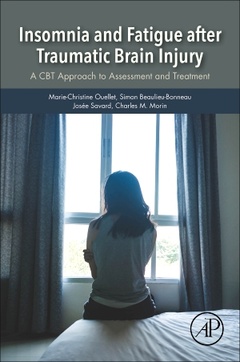Description
Insomnia and Fatigue after Traumatic Brain Injury
A CBT Approach to Assessment and Treatment
Authors: Ouellet Marie-Christine, Beaulieu-Bonneau Simon, Savard Josee, Morin Charles M.
Language: English
Subject for Insomnia and Fatigue after Traumatic Brain Injury:
Keywords
insomnia; fatigue; sleep; brain injury; TBI; REM; Wakefulness
59.52 €
In Print (Delivery period: 14 days).
Add to cart306 p. · 15x22.8 cm · Paperback
Description
/li>Contents
/li>Readership
/li>Biography
/li>Comment
/li>
Insomnia and fatigue are two of the most frequent consequences after traumatic brain injury (TBI). About 30% of individuals suffer from chronic insomnia, an additional 20% have symptoms of insomnia, and up to 75% have significant and persistent fatigue. There is a strong empirical basis for the effectiveness of cognitive-behavioral interventions for the management of insomnia and fatigue in the general population and in other patient populations, and emerging research shows that these interventions seem applicable with similar benefits to people with TBI. Insomnia and Fatigue After Traumatic Brain Injury: A CBT Approach to Assessment and Treatment is written by a team of four scientist-practitioners in psychology who are experts in sleep medicine, cognitive-behavioral therapy for insomnia, and traumatic brain injury (TBI). Together they have authored this assessment and intervention manual for insomnia and fatigue, intended for clinicians working with the TBI population. Based on cognitive-behavioral principles, the manual integrates evidence-based interventions and techniques used by expert clinicians working with these populations. Throughout the development process, there has been an ongoing integration of the best available research, specialized clinical expertise, and knowledge transfer expertise: all of these perspectives were used to choose, revise, and format the content of the manual as to ensure that it would be most useful for the target audience.
PART I: Essential Background
1. Insomnia and Fatigue Following Traumatic Brain Injury: Prevalence, Correlates Evolution, and Treatment Options
2. Assessment of Insomnia and Fatigue Following Traumatic Brain Injury
3. CBT Interventions for Insomnia and Fatigue in the Context of TBI: Rationale, Adaptations, and Clinical Challenges
PART II: Practical Tools
4. Assessment Tools for Post-TBI Insomnia
5. Assessment Tools for Post-TBI Fatigue
6. Intervention Tools for Post-TBI Insomnia
7. Intervention Tools for Post-TBI Fatigue
9. Detailed Treatment Plan
Simon Beaulieu-Bonneau obtained a doctorate in psychology, research and intervention, clinical orientation (Ph.D.) from Laval University in 2012. During his doctoral studies, he did a clinical neuropsychology internship at Baycrest Health Sciences in Toronto. (2010-2011). Between 2012 and 2018, he worked as a research professional at the Center for Interdisciplinary Research in Rehabilitation and Social Integration (CIRRIS) and at Laval University. He joined the School of Psychology at Université Laval as an Assistant Professor in September 2018. His research interests focus on the evaluation, intervention and mobilization of knowledge in neuropsychology of rehabilitation, particularly with adult clients who have suffered a traumatic brain injury or a cerebrovascular accident. He also has expertise in the field of sleep disorders, especially insomnia, and geriatric neuropsychology. A member of the Ordre des psychologues du Québec since 2005 and holder of an assessment certificate for neuropsychological disorders since 2012, Mr. Beaulieu-Bonneau is involved in training an
- Authored by specialists in sleep medicine, CBT and TBI
- Covers both assessment and treatment for TBI insomnia and fatigue
- Contains treatment plans in detail
- Suitable for inpatient and outpatient settings
- Appropriate for mild to severe TBI
- Includes extensive patient handouts




